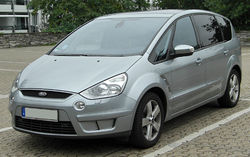Ford S-Max
This article needs additional citations for verification. (April 2010) |
| Ford S-Max | |
|---|---|
 | |
| Overview | |
| Manufacturer | Ford Motor Company |
| Production | 2006–present |
| Assembly | Genk, Belgium Chongqing, China[1] |
| Designer | David Hilton |
| Body and chassis | |
| Class | Large MPV |
| Body style | 5-door MPV |
| Platform | Ford EUCD platform |
| Related | Ford Galaxy Ford Mondeo |
| Dimensions | |
| Wheelbase | 2,850 mm (112.2 in) |
| Length | 4,770 mm (187.8 in) |
| Width | 1,885 mm (74.2 in) |
| Height | 1,660 mm (65.4 in) |
| Curb weight | 2,340 kg (5,160 lb) |
The Ford S-Max (stylized as Ford S-MAX) is an MPV produced by the Ford Motor Company for the European market and by Chang'an Ford Automobile Co., Ltd for the Chinese (Mainland) market. Introduced at the 2006 Geneva Motor Show, the S-Max went on sale alongside the new generation Galaxy in June 2006. It is intended to be sporty like a saloon and spacious like an MPV. It shows inspiration from the seven-seater large MPV Galaxy and compact MPV Ford C-Max. The S-Max has received many positive reviews and awards, and was voted European Car of the Year 2007 on 13 November 2006. In the future Ford is planning to sell the S-Max in Japan under the subsidiary brand Mazda.
Features
The S-Max is the first vehicle in Ford's lineup to feature their Kinetic Design styling. The Kinetic Design scheme includes angular headlights, twin trapezoidal grilles, and large wheelarches.
One major selling point of the S-Max is its "Fold Flat System". This design allows the second and third-row seats to fold seamlessly into the floor, leaving extra storage space.
Models
For the English speaking markets there are three derivatives of the S-Max; Edge, Zetec, and the high-end Titanium. Ford has stated that around sixty percent of all S-Max buyers choose Titanium specification. Continental trim levels are Trend, Titanium and the top of the line Titanium S.
In March 2008, a powerful 2.2 175 PS TDCi common-rail diesel was added to Titanium series and delivers acceleration from 0-60 mph in 9.0 seconds.
In September 2008, the popular 2.0 140 PS TDCi manual engine was offered with a CO2 of 159 g/km.
The S-Max Trend is going to debut in China in 2010. The Trend is basically a normal S-Max, but without the back row of seats. The idea is to make it cheaper, and to give more storage space to people who might want it.
In 2010 the S-MAX was given a facelift.
Powertrain
All S-Max's use versions of the Ford Duratorq engine or Ford Duratec engine. The S-Max uses a five- speed or six- speed manual transmission, and a six-speed automatic option.
- 1.8 TDCi 125 PS, 5 Speed Manual (123 hp)
- 1.8 TDCi 125 PS, 6 Speed Manual (123 hp)
- 2.0 TDCi 140 PS, 6 Speed Manual (143 hp)
- 2.0 145 PS, 5 Speed Manual (138 hp)
- 2.0 145 Flex Fuel, 5 Speed Manual (128 hp)
- 2.2 TDCi 175 PS, 6 Speed Manual (173 hp)
- 2.3 161 PS, 6 Speed Automatic (158 hp)
- 2.5 220 PS, 6 Speed Manual (217 hp)(shared with the Ford Focus ST)
- This vehicle has also been converted to use an aftermarket (conversion) hybrid powertrain:Langford Performance Engineering 'Whisper' powertrain
New petrol engines for the 2010/2011 Models:
- 1.6 STCi EcoBoost, 6 Speed Manual, 160 HP
- 2.0 STCi EcoBoost, Powershift, 203 HP
Safety
The Ford S-Max incorporates no breakthrough safety features, but it has received a 5- Star/ 36 Point (Best in Class) rating from the Euro NCAP. The S-Max's safety features include the Intelligent Protection System (IPS) which combines a body structure optimised for strength and crashworthiness with state-of-the-art restraint equipment and driver aids that help avoid an accident and features that lessen the likelihood of injuries in an impact. It has many modern airbags, including a knee airbag and a thorax airbag. S-Max's also have an advanced neck protection system, three-point seat belts, optimised pre-tensioners, load limiters, anti-submarining seat subframes, a collapsible steering system and safety pedals. For handling it has an Anti-Lock Braking System (ABS), of course, along with Electronic Brakeforce Distribution (EBD) and standard Electronic Stability Program (ESP) system.
References
- ^ "Facilities". Ford Motor Company. Retrieved 2010-10-05.
